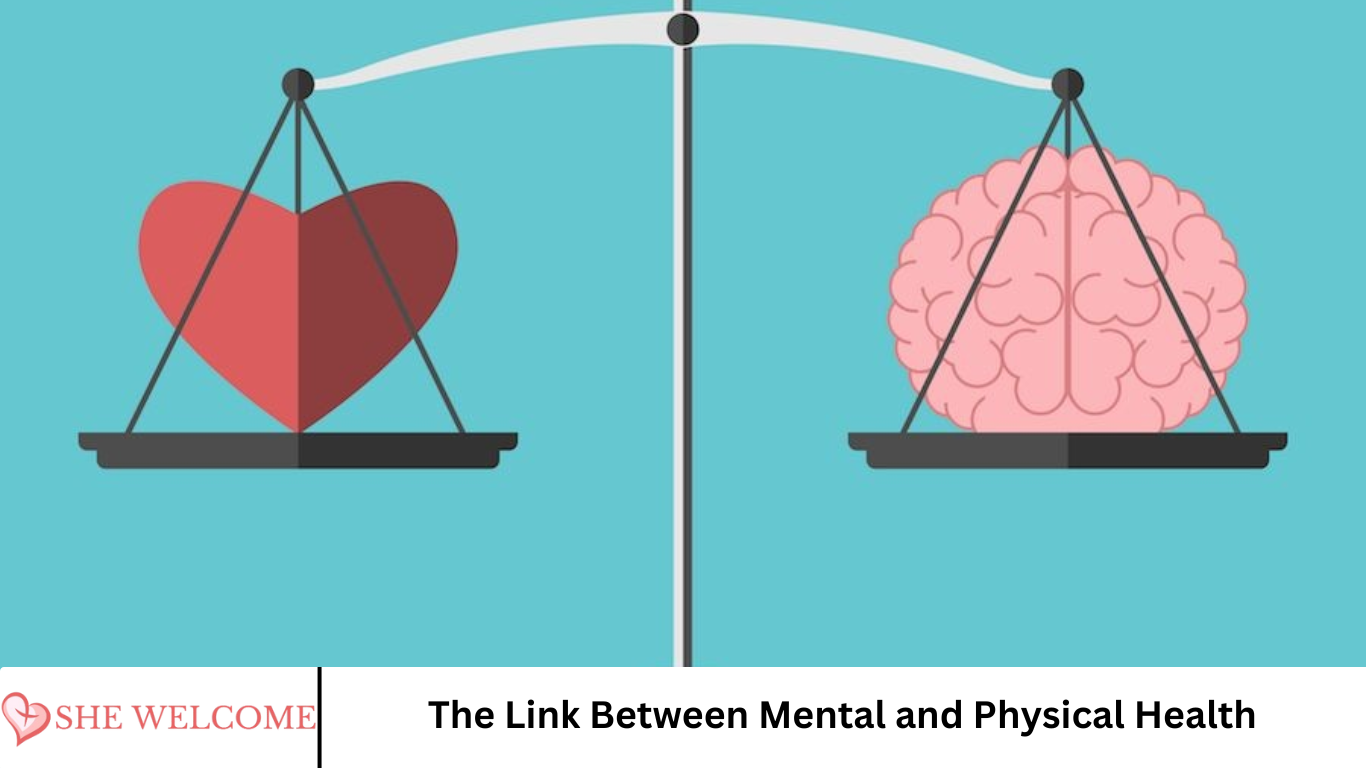In today’s fast-paced world, mental and physical health are often viewed in isolation—but growing evidence shows they are profoundly connected. Mental well-being influences your physical health, just as physical conditions shape your psychological state. Understanding this dynamic relationship is essential for holistic wellness.
More Read: Strategies for Enhancing Immune Function
1. What Is the Mind‑Body Connection?
Modern medicine no longer sees the mind and body as separate entities. The biopsychosocial model, introduced by George Engel in 1977, emphasizes that biological, psychological, and social factors all intertwine to shape health and disease. Physical ailments can trigger mental symptoms, and vice versa, often via shared pathways like inflammation, stress responses, or unhealthy behaviors.
2. How Mental Health Affects Physical Health
Chronic Stress & Inflammation
Persistent anxiety, depression, or stress triggers chronic activation of the nervous and endocrine systems, leading to elevated cortisol and inflammatory markers. Over time, these biochemical changes contribute to hypertension, cardiovascular disease, metabolic syndrome, and autoimmune disorders.
Depression and Multimorbidity
A study involving over 172,500 UK adults found that those with depression developed multiple chronic conditions faster—on average one new condition every five years, compared to every 6.25 years among non-depressed individuals. Additionally, psychiatric patients are nearly twice as likely to experience multiple physical illnesses.
Sleep Problems
Mental illnesses are frequently accompanied by insomnia or sleep apnea. Poor sleep not only worsens mood but also raises the risk of obesity, diabetes, and cardiovascular disease .
Immune Function & Infections
Stress and mental health disorders impair immune response, increasing susceptibility to infections and slowing recovery. Loneliness—a psychological stressor—has been linked to high levels of inflammation proteins associated with heart disease and stroke.
3. How Physical Health Affects Mental Well‑being
Chronic Illness & Psychological Impact
Living with persistent health issues—such as pain, diabetes, or heart disease—can lead to depression, anxiety, low self-esteem, and social isolation.
The Role of Physical Activity
Regular exercise isn’t just for muscles; it releases endorphins and brain-derived neurotrophic factor (BDNF), boosting mood and memory. One study on Finnish adults aged 60–88 showed that those with positive mental health engaged in more physical activity during COVID‑19 lockdowns—and remained healthier longer.
Body Composition & Mood
Among young men, higher body fat and sedentary behavior were linked to more severe depressive symptoms, highlighting how physical health shapes mental state.
4. Shared Pathways & Mechanisms
Neuroendocrine Responses
The hypothalamic–pituitary–adrenal (HPA) axis regulates stress hormones like cortisol. When it’s chronically activated, it impairs immunity, disrupts metabolism, and affects mood.
Inflammation as a Bridge
Chronic inflammation is implicated in depression, heart disease, respiratory disorders, and neurodegenerative diseases .
Autonomic Nervous System
Conditions like anxiety or PTSD can elevate sympathetic nervous system activity, leading to increased heart rate, blood pressure, and risk of cardiac disease.
Behavioral Mediators
Mental health affects behaviors such as exercise, diet, sleep, and substance use—all of which directly impact physical health .
5. Key Evidence & Studies
| Study | Findings |
|---|---|
| English Longitudinal Study of Ageing | Past mental health impacts current physical ability, mediated partly by lifestyle choices. |
| UK Biobank | Depression linked to faster development of high blood pressure, allergies, osteoarthritis, reflux, etc. . |
| Anglia Ruskin University (BMJ Mental Health) | Individuals with severe mental illness had 1.84× higher odds of physical multimorbidity . |
| Pakistan-wide COVID‑19 survey | People with worse physical symptoms during lockdown reported significantly higher psychological distress . |
| Lonelygenic urban planning | Social isolation from urban design increases loneliness and related health risks . |
| Nature exposure studies | Green environments reduce stress, bolster mood, evaluate cognition, and lower psychiatric risk . |
6. Social Factors & Lifestyle Influences
Social Connection
Isolation can be more harmful than smoking five cigarettes a day. Loneliness suppresses immunity, increases inflammation, and raises risk of heart disease .
Diet & Gut Microbiome
Healthy, fiber-rich diets promote gut diversity and reduce inflammation. A diverse microbiome supports mood regulation through neurotransmitters like serotonin.
Mindfulness & Nature
Techniques like mindfulness-based stress reduction (MBSR) help mitigate stress, anxiety, and burnout. Time in nature enhances both psychological well-being and physical recovery.
7. Practical Strategies for Integration
1. Prioritize physical activity
Aim for ≥150 minutes of moderate exercise weekly. Activities like walking, swimming, or yoga improve both mood and physical health.
2. Build strong social ties
Join community groups, team sports, volunteer work, or keep in regular contact with loved ones.
3. Focus on diet
Eat whole foods, fruits, vegetables, lean protein, and fermented foods to support gut and brain health.
4. Practice stress management
Incorporate deep breathing, meditation, or stick to structured programs like MBSR.
5. Increase nature time
Even short nature breaks (e.g., 40 s “green breaks” at work) can boost cognition and mental clarity .
6. Monitor sleep cues
Maintain good sleep hygiene—consistent schedule, tech-free evenings, calm pre-sleep routines.
7. Seek holistic care
Look for integrated health services addressing both mental and physical needs, especially if you have chronic health issues.
8. Policies and Future Directions
Holistic Healthcare
Health systems are transitioning toward whole-person care. For example, post-COVID protocols now often include mental health alongside physical rehab .
Environment & Planning
Urban planners are introducing “lonelygenic” solutions—green spaces, nature-based group activities—to combat isolation and poor health.
Digital Tools & AI
Emerging AI-powered platforms can detect early signs of depression, PTSD, and stress, and provide personalized mental health support .
9. Unlocking the Balanced Body–Mind
- ✔️ Understand that mental distress often manifests physically.
- ✔️ Recognize that chronic health problems increase the likelihood of psychological illness.
- ✔️ Choose integrated strategies—mindfulness, diet, exercise, social support, and nature exposure—that target both domains.
Frequently Asked Question
How does mental health affect physical health?
Poor mental health can lead to chronic stress, which increases inflammation, weakens the immune system, and raises the risk for conditions like heart disease, high blood pressure, and diabetes. It can also contribute to unhealthy habits like poor sleep, poor diet, and lack of exercise.
Can physical illness cause mental health problems?
Yes. Chronic illnesses such as cancer, diabetes, or chronic pain can increase the risk of depression, anxiety, and emotional distress. Coping with long-term health issues often affects a person’s mood, self-esteem, and outlook on life.
Why is the mind-body connection important?
Understanding the mind-body connection helps in treating the whole person, not just symptoms. It encourages integrated care approaches that consider both emotional and physical well-being, leading to better health outcomes.
What are common symptoms that show mental health is affecting physical health?
- Fatigue
- Headaches
- Stomach issues
- Muscle tension
- Weakened immunity
- Sleep problems
These can all be physical signs of underlying stress, anxiety, or depression.
How can I improve both my mental and physical health at the same time?
Engage in regular physical activity, eat a balanced diet, get enough sleep, spend time in nature, practice mindfulness, and stay socially connected. These habits support both mental clarity and physical resilience.
Is exercise good for mental health too?
Absolutely. Exercise releases endorphins and serotonin, which help reduce stress, anxiety, and depression. Regular movement also improves sleep, focus, and self-esteem.
When should I seek help for mental or physical health issues?
If you notice persistent changes in mood, energy, appetite, sleep, or physical health that interfere with daily life, it’s time to seek help. Talk to a doctor, therapist, or mental health professional—early support makes a big difference.
Conclusion
The connection between mental and physical health is not just real—it’s scientifically established. Prioritizing one supports the other, and neglecting either can initiate a harmful cycle. Through exercise, quality sleep, nourishing food, stress management, social engagement, and a healthy environment, you can build a resilient mind and body. Embrace holistic care—it’s the path to thriving in body and mind.


